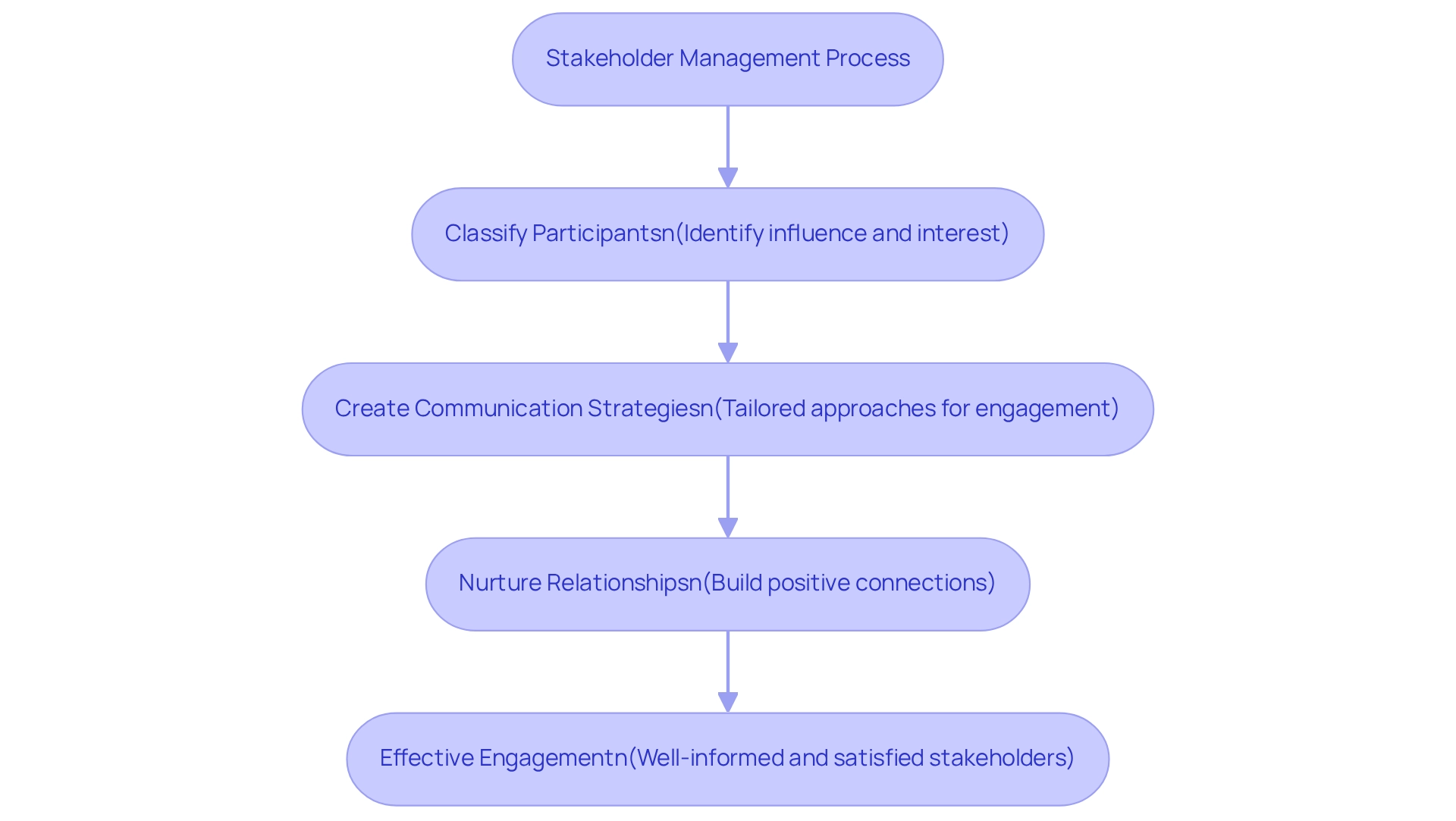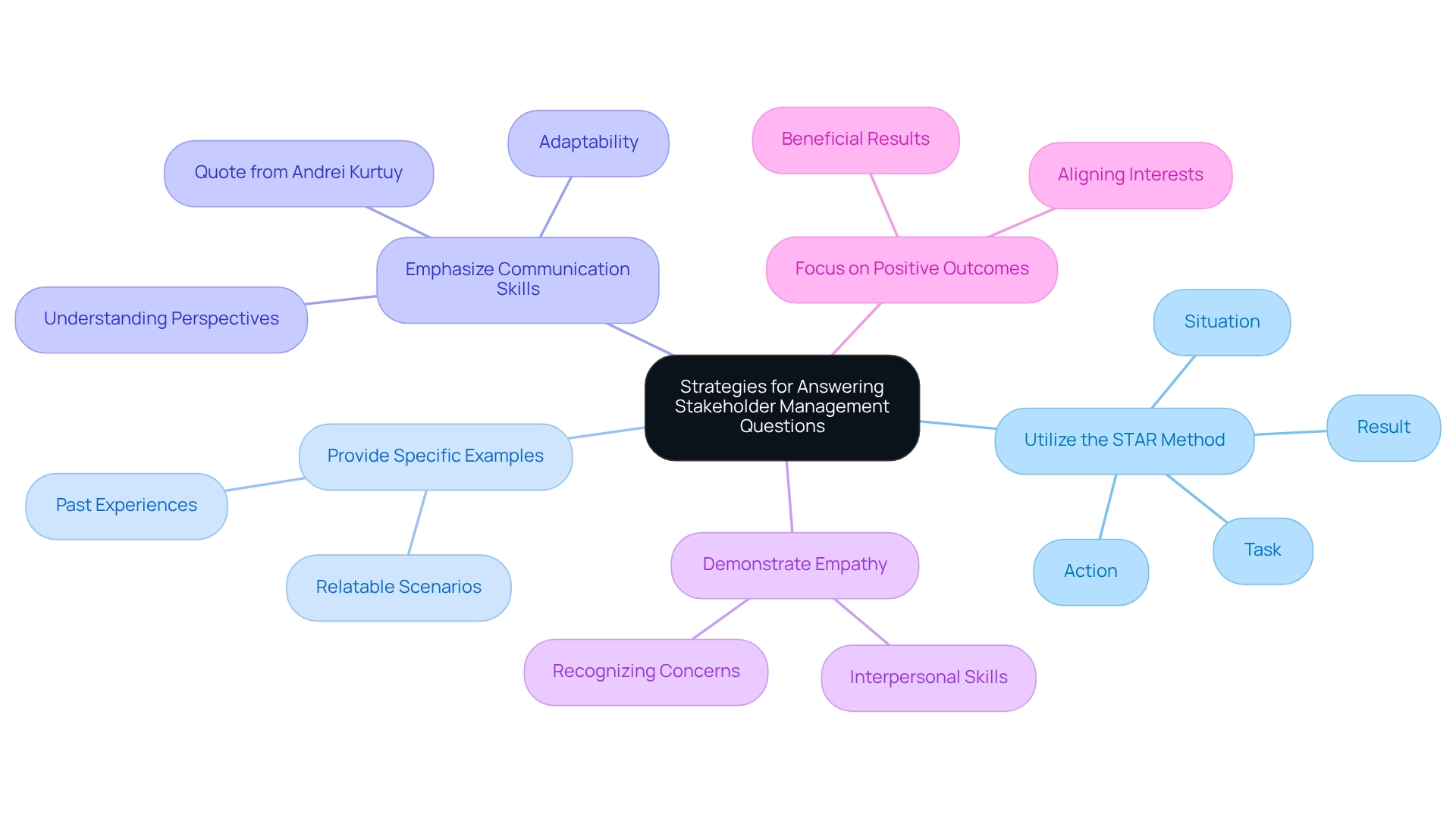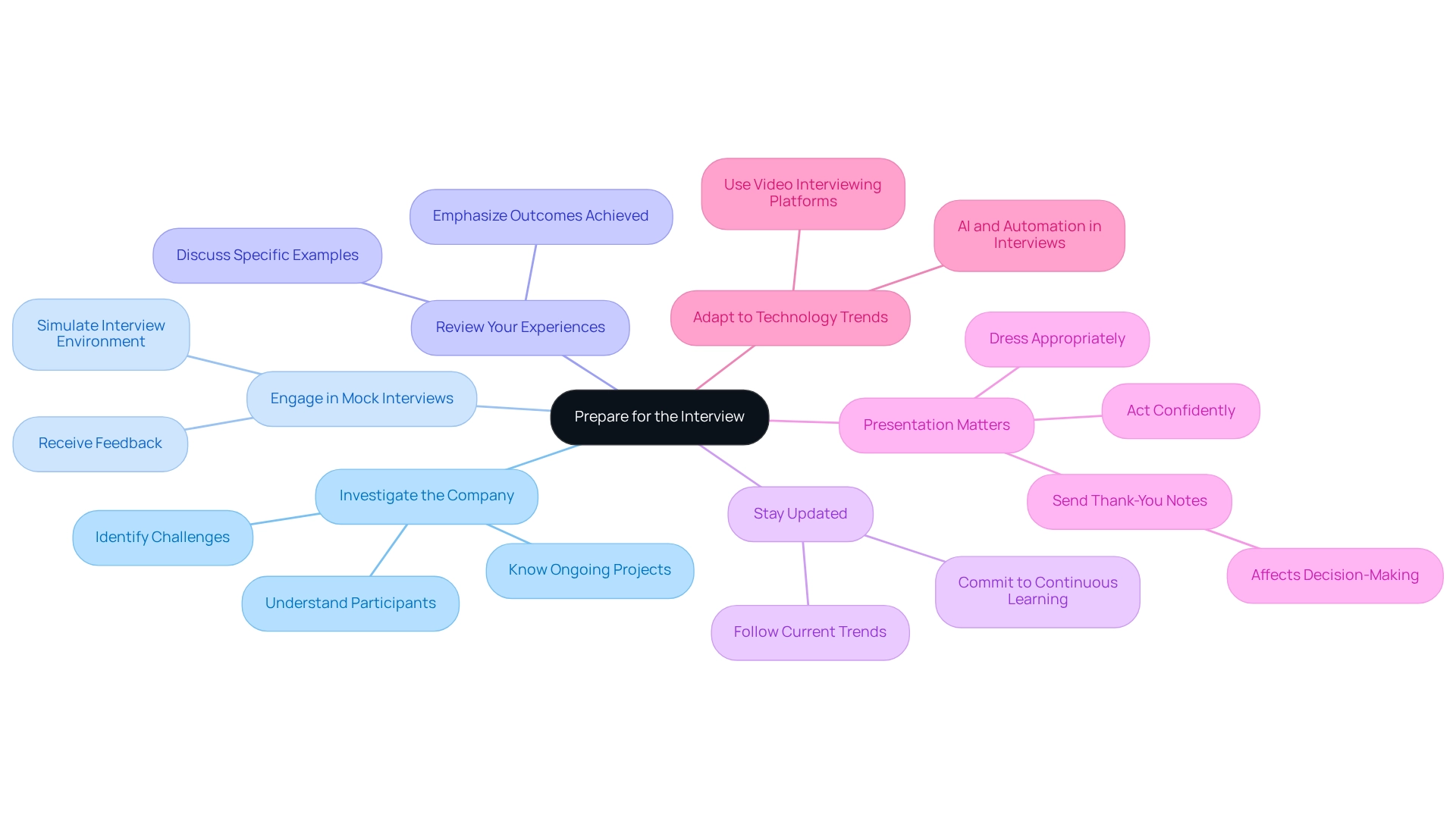Overview
To effectively address stakeholder management interview questions, candidates must implement strategic approaches such as the STAR method, which emphasizes the importance of providing specific examples and showcasing strong communication skills. These strategies are crucial for illustrating past experiences and adapting communication styles, thereby fostering trust and achieving favorable outcomes in stakeholder relationships.
Moreover, by demonstrating expertise in these areas, candidates can significantly enhance their appeal to potential employers. Consequently, it is essential for candidates to prepare thoroughly, ensuring they can articulate their experiences and insights clearly and convincingly.
Introduction
In the realm of project management, the ability to effectively engage and manage stakeholders can make or break a project's success. Stakeholder management is not merely a procedural task; it is a strategic approach that involves understanding the diverse needs and expectations of individuals or groups invested in a project.
As organizations navigate increasingly complex landscapes, the importance of mastering stakeholder dynamics has never been more critical. This article delves into the essentials of stakeholder management, offers insights into common interview questions, and provides actionable strategies for candidates to stand out in competitive job markets.
By honing these skills, professionals can enhance their effectiveness and contribute to achieving project goals while fostering positive relationships with stakeholders.
Define Stakeholder Management
Stakeholder oversight represents a systematic process of identifying, analyzing, and engaging individuals or groups with a vested interest in or affected by an initiative or organization. This method necessitates a profound comprehension of the needs, expectations, and potential impacts of interested parties on results. Efficient engagement of these parties is essential for success, as it ensures they are well-informed, actively involved, and satisfied throughout the lifecycle of the initiative.
This process involves:
- Classifying participants based on their influence and interest
- Creating tailored communication strategies
- Nurturing [[[positive relationships
Businesses](https://itsdart.com/blog/why-is-stakeholder-management-important)](https://itsdart.com/blog/why-is-stakeholder-management-important)](https://itsdart.com/blog/why-is-stakeholder-management-important) that prioritize stakeholder management have been shown to achieve a 40% reduction in delays, highlighting the tangible benefits of effective involvement. Moreover, recent trends indicate a cultural shift towards collaborative participant engagement, transitioning from traditional monologue approaches to dynamic dialogues that emphasize shared values and mutual influence.
By incorporating real-time analysis through tools such as client dashboards, organizations can consistently track participant engagement and operationalize lessons learned, thereby improving overall performance. Furthermore, testing hypotheses related to participant interactions can yield valuable insights, ensuring that engagement strategies are effective and aligned with project goals. Metrics should capture relational quality and mutual influence, offering a more nuanced understanding of engagement effectiveness.

Identify Common Stakeholder Management Interview Questions
Management interview questions are strategically designed to assess how to answer stakeholder management interview questions, evaluating a candidate's grasp of dynamics and their proficiency in navigating complex relationships. Key inquiries include:
- How do you balance your priorities when working with multiple stakeholders?
- Can you describe your approach to identifying and prioritizing interested parties in a project?
- How do you manage conflicting interests among involved parties?
- What strategies do you use to build trust with involved parties?
- Can you provide an example of a time you successfully managed a challenging party?
These questions not only examine a candidate's technical skills but also their understanding of how to answer stakeholder management interview questions related to interpersonal capabilities. For instance, a project manager noted, "To manage various requests from different parties, I employ a systematic method that takes into account the significance and urgency of each request." This underscores the critical nature of effective prioritization. Moreover, insights from case studies, such as the Critical Incident Technique in Stakeholder Analysis, illustrate how gathering detailed narratives about participant interactions can elucidate the complexities of these relationships, thereby enhancing understanding of involvement dynamics. This technique offers valuable insights into the temporality of stakeholder-related events, which is essential for adeptly navigating these interactions. Understanding how to answer stakeholder management interview questions is vital, especially as employer preferences increasingly favor candidates who can demonstrate effective relationship management skills—a trend supported by the evolving landscape of engagement since 2004.
Develop Strategies for Answering Stakeholder Management Questions
To effectively answer stakeholder management questions, consider the following strategies:
- Utilize the STAR Method: Structure your responses using the Situation, Task, Action, Result framework. This approach allows you to present clear and concise answers that highlight your problem-solving abilities.
- Provide Specific Examples: Draw from your past experiences to showcase your skills in managing interested parties. Concrete examples not only illustrate your capabilities but also make your responses more relatable and impactful.
- Emphasize Communication Skills: Highlight your ability to communicate effectively with various parties. Adaptability in your communication style is crucial, as it demonstrates your understanding of different perspectives and needs. As Andrei Kurtuy, Co-Founder & Career Expert, observes, "Interview feedback remains rare, with only 41 percent of applicants receiving feedback after their interviews," emphasizing the significance of clear communication.
- Demonstrate Empathy: Discuss how you recognize and address the concerns of involved parties. Showcasing your interpersonal skills and emotional intelligence can significantly enhance your appeal as a candidate.
- Focus on Positive Outcomes: Illustrate how your actions led to beneficial results for both parties involved and the project. This not only strengthens your effectiveness in engaging with partners but also aligns with organizational objectives, which is crucial for any CFO. Comprehending the expectations of involved parties assists in aligning their interests with organizational objectives, enhancing the impact of your responses.
In a competitive job market where, on average, 118 individuals apply for each position, understanding how to answer stakeholder management interview questions can help you distinguish yourself as a candidate. Furthermore, findings from case studies, like the significance of diversity in recruitment strategies, emphasize the changing nature of participant involvement and its importance in current hiring practices.

Prepare for the Interview: Research and Practice Techniques
To effectively prepare for how to answer stakeholder management interview questions, consider these essential strategies:
- Investigate the Company: Attain a thorough grasp of the organization’s participants, ongoing projects, and possible challenges. This insight will enable you to understand how to answer stakeholder management interview questions in a way that aligns with the company’s specific needs and demonstrates your proactive approach. To effectively prepare for project oversight interviews, practice how to answer stakeholder management interview questions by familiarizing yourself with standard inquiries. Rehearse your answers to ensure clarity and confidence, which are crucial for making a positive impression.
- Engage in Mock Interviews: Simulate the interview environment by conducting practice sessions with a friend or mentor. This exercise not only helps you refine your responses but also provides valuable feedback to enhance your performance.
- Review Your Experiences: Reflect on your past interactions with involved parties. Be prepared to discuss specific examples of how to answer stakeholder management interview questions, emphasizing your role and the outcomes achieved. This will showcase your practical experience and problem-solving abilities.
- Stay Updated: Keep informed about current trends and best practices in stakeholder management. Showing your commitment to continuous learning can distinguish you from other applicants and emphasize your dedication to the field.
Statistics indicate that 50% of interviewers agree that many applicants are rejected solely based on how they dress, act, or even walk through the door. Moreover, 63% of hiring managers acknowledge the impact of AI and automation on interview processes, making it essential to adapt your strategies accordingly. Comprehending the significance of company research can greatly improve your likelihood of success in interviews, as numerous applicants are frequently turned down due to superficial factors. Furthermore, 80% of hiring managers say that receiving a thank-you note affects their decision-making process, with 22% stating it has a significant impact. By implementing these techniques, you can position yourself as a strong candidate who knows how to answer stakeholder management interview questions.

Conclusion
Mastering stakeholder management is not just crucial; it is essential for professionals aiming to excel in project management. This article has systematically explored the process of identifying, analyzing, and engaging stakeholders to ensure project success. By understanding stakeholders' needs and effectively communicating with them, project managers can cultivate positive relationships that significantly contribute to achieving project goals. The benefits of prioritizing stakeholder management are clear, with organizations reporting substantial reductions in project delays.
In the competitive landscape of job interviews, candidates must be equipped to answer common stakeholder management questions with confidence. Employing strategies such as the STAR method, providing specific examples, and demonstrating empathy can distinctly set candidates apart. Moreover, thorough preparation—ranging from researching the company to participating in mock interviews—can enhance both confidence and clarity during the interview process.
Ultimately, the ability to navigate stakeholder dynamics not only strengthens individual careers but also propels organizational success. As the project management landscape continues to evolve, developing these skills will remain crucial for professionals striving to make a meaningful impact in their roles. Embracing a proactive approach to stakeholder engagement will undoubtedly pave the way for future successes in both projects and careers.
Frequently Asked Questions
What is stakeholder oversight?
Stakeholder oversight is a systematic process of identifying, analyzing, and engaging individuals or groups with a vested interest in or affected by an initiative or organization.
Why is stakeholder engagement important?
Efficient engagement of stakeholders is essential for success as it ensures they are well-informed, actively involved, and satisfied throughout the lifecycle of the initiative.
What are the key components of the stakeholder engagement process?
The key components include classifying participants based on their influence and interest, creating tailored communication strategies, and nurturing positive relationships.
What benefits do businesses experience from effective stakeholder management?
Businesses that prioritize stakeholder management can achieve a 40% reduction in delays, highlighting the tangible benefits of effective involvement.
How is the approach to stakeholder engagement changing?
There is a cultural shift towards collaborative participant engagement, moving from traditional monologue approaches to dynamic dialogues that emphasize shared values and mutual influence.
What tools can organizations use to track stakeholder engagement?
Organizations can use tools such as client dashboards to consistently track participant engagement and operationalize lessons learned.
How can testing hypotheses related to participant interactions be beneficial?
Testing hypotheses related to participant interactions can yield valuable insights, ensuring that engagement strategies are effective and aligned with project goals.
What metrics should be used to assess engagement effectiveness?
Metrics should capture relational quality and mutual influence, providing a more nuanced understanding of engagement effectiveness.




